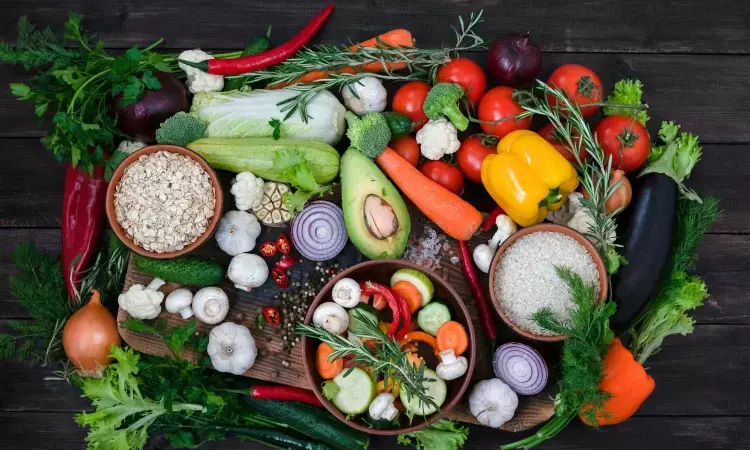- Home
- Medical news & Guidelines
- Anesthesiology
- Cardiology and CTVS
- Critical Care
- Dentistry
- Dermatology
- Diabetes and Endocrinology
- ENT
- Gastroenterology
- Medicine
- Nephrology
- Neurology
- Obstretics-Gynaecology
- Oncology
- Ophthalmology
- Orthopaedics
- Pediatrics-Neonatology
- Psychiatry
- Pulmonology
- Radiology
- Surgery
- Urology
- Laboratory Medicine
- Diet
- Nursing
- Paramedical
- Physiotherapy
- Health news
- Fact Check
- Bone Health Fact Check
- Brain Health Fact Check
- Cancer Related Fact Check
- Child Care Fact Check
- Dental and oral health fact check
- Diabetes and metabolic health fact check
- Diet and Nutrition Fact Check
- Eye and ENT Care Fact Check
- Fitness fact check
- Gut health fact check
- Heart health fact check
- Kidney health fact check
- Medical education fact check
- Men's health fact check
- Respiratory fact check
- Skin and hair care fact check
- Vaccine and Immunization fact check
- Women's health fact check
- AYUSH
- State News
- Andaman and Nicobar Islands
- Andhra Pradesh
- Arunachal Pradesh
- Assam
- Bihar
- Chandigarh
- Chattisgarh
- Dadra and Nagar Haveli
- Daman and Diu
- Delhi
- Goa
- Gujarat
- Haryana
- Himachal Pradesh
- Jammu & Kashmir
- Jharkhand
- Karnataka
- Kerala
- Ladakh
- Lakshadweep
- Madhya Pradesh
- Maharashtra
- Manipur
- Meghalaya
- Mizoram
- Nagaland
- Odisha
- Puducherry
- Punjab
- Rajasthan
- Sikkim
- Tamil Nadu
- Telangana
- Tripura
- Uttar Pradesh
- Uttrakhand
- West Bengal
- Medical Education
- Industry
'Green' Mediterranean Diet has "biggest impact" on proximal aortic de-stiffening: JACC

USA: Post hoc analysis of a randomized trial revealed that aortic stiffness regressed in overweight or dyslipidemic individuals who started a healthy diet; the biggest benefit was seen with a low-calorie "green" Mediterranean diet. Researchers found that the green Mediterranean diet regressed proximal aortic stiffness by 15%, the Mediterranean diet by 7.3%, and the healthy dietary guideline-directed diet by 4.8%.
The study, published in JACC (Journal of the American College of Cardiology), showed that green Mediterranean-high polyphenols diet substantially regresses proximal aortic stiffness (PAS), a marker of vascular ageing and increased cardiovascular risk.
The green Mediterranean diet was pitted against the healthy Mediterranean diet and a healthy guideline-recommended control diet in the DIRECT PLUS, a large-scale clinical intervention trial.
DIRECT PLUS was a large-scale, long-term clinical trial over 18 months among 300 participants, which used MRIs to measure aortic stiffness, the most accurate noninvasive measure.
Aortic stiffness is a measure of the elasticity of the blood vessel wall. It occurs when the elastic fibres within the arterial wall (elastin) begin to fray due to mechanical stress. Proximal aortic stiffness (PAS) reflects the aortic stiffness from the ascending to the proximal-descending thoracic aorta, the section of the aorta, the largest artery in the body that carries oxygen-rich blood away from the heart. Proximal aortic stiffness is a distinct marker of vascular ageing and an independent cardiovascular risk factor to predict morbidity and mortality.
The research was led by Prof. Iris Shai of Ben-Gurion University of the Negev, Israel, an adjunct Professor from the Harvard School of Public Health and an honorary professor at the University of Leipzig, Germany, along with her PHD student Dr. Gal Tsaban, a cardiologist from Soroka University Medical Center, and colleagues from Harvard and Leipzig Universities.
The DIRECT-PLUS trial research team was the first to introduce the concept of the green-Mediterranean, high polyphenols diet. This modified Mediterranean diet is distinct from the traditional Mediterranean diet because of its more abundant dietary polyphenols (phytochemicals, secondary metabolites of plant compounds that offer various health benefits) and lower red/processed meat. On top of a daily intake of walnuts (28 grams), the green-Mediterranean dieters consumed 3-4 cups of green tea and 1 cup of Wolffia-globosa (Mankai) plant green shake of duckweed per day over 18 months. The aquatic green plant Mankai is high in bioavailable iron, B12, 200 kinds of polyphenols and protein, and is therefore a good substitute for meat.
The team has shown in previous studies that the green Mediterranean, high polyphenols diet has various salutary effects ranging from reshaping the microbiome (Gastroenterology 2021) to halting brain atrophy (AJCN 2022) and regressing hepatosteatosis (Gut 2021) and visceral adiposity (BMC Med 2022).
"A healthy lifestyle is a strong basis for improving cardiometabolic health. We learned from our experiment results that diet quality is crucial for mobilizing atherogenic adipose tissues, lowering cardiometabolic risk, and improving one's adiposity profile. Dietary polyphenols, substituting red meat with equivalent plant-based protein, show promise for improving various aspects of human health. However, no dietary strategies have been shown to impact vascular ageing physiology," says Prof. Shai.
"Maintaining a healthy diet alone is associated with PAS regression. The green-Mediterranean diet provides a 15% dramatic reduction in PAS, gained by making simple and feasible changes to your diet and lifestyle. The results of our study highlight, once again, that not all diets provide similar benefits and that the green-Mediterranean diet may promote vascular health," notes Dr. Tsaban.
Reference:
Gal Tsaban, Aryeh Shalev, Amos Katz, Anat Yaskolka Meir, Ehud Rinott, Hila Zelicha, Alon Kaplan, Arik Wolak, Matthias Bluher, Meir J. Stampfer, Iris Shai, Effect of Lifestyle Modification and Green Mediterranean Diet on Proximal Aortic Stiffness, Journal of the American College of Cardiology, https://doi.org/10.1016/j.jacc.2023.02.032.
Dr Kamal Kant Kohli-MBBS, DTCD- a chest specialist with more than 30 years of practice and a flair for writing clinical articles, Dr Kamal Kant Kohli joined Medical Dialogues as a Chief Editor of Medical News. Besides writing articles, as an editor, he proofreads and verifies all the medical content published on Medical Dialogues including those coming from journals, studies,medical conferences,guidelines etc. Email: drkohli@medicaldialogues.in. Contact no. 011-43720751


